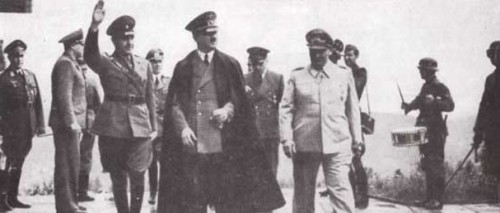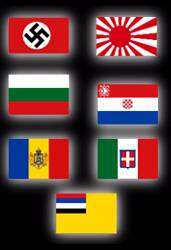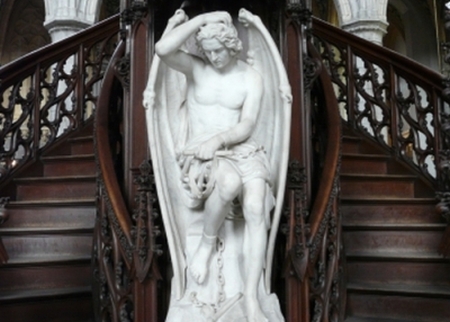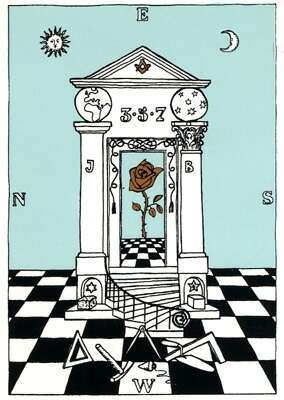Ante Pavelic A thousand years ago, the Croat people had already chosen the Western Culture and civilization. Standing on the border between East and West, it successfully defended this border, despite great sacrifices, against Byzantine and Turkish attacks in a struggle lasting for centuries, fighting in its own defense, but also in defense of all Europe. During these thousand years, the Croats stood on one side and the Serbs on the other of a frontier which also forms the border between Western Civilization and the Orient. . . . The Croats, a people conscious of their thousand-year-old national individuality, cannot and will not ever give up this individuality, and will resist unconditionally, with all available means, its destruction. This Croat life force is a fact which cannot be affected by any reasons, explanations or arguments, a fact which is indisputable and not subject to discussion. Thus life itself demonstrates the falsehood of the arguments of the victors of the [First] World War. . . . From the fact that the Croats are an independent ethnic personality and not a part of a fictitious Yugoslav nation, the other fact inevitably follows, that the Croats do not accept the contemporary Yugoslav state but reject it with all determination. This state was established against the will of the Croat people; the committee of the Zagreb National Diet which proclaimed the unification of Croatia and Serbia on 1 December 1918 was never empowered to do so by the Croat people. Within a few days of this unification, the Croat resistance had to be suppressed with machine guns. . . . Thus was Croatia cast into the confusion of a total Balkan chaos, overflowing with political and private amorality, where disorder and corruption characterize the normal form of state administration and immorality is the ideal of private life. . . The Croat liberation movement demands the reconstruction of a free and independent Croat state comprising the entire historical and ethnic territory of the Croat people. It strives for this end because it corresponds to the will of the whole Croat nation and to its vital needs, because the Croat nation has an incontrovertible right thereto, and because no one is empowered to deny it this right under any pretext whatever. . . . Principles of the Ustasha Movement (1941) 1. The Croat nation is an independent ethnic entity. It is a nation in itself, and, in respect of nationality, is not identical with any other nation, nor is it a tribe or branch of another nation. . . . 9. The Croat nation, taken as a whole, has a right to happiness and prosperity, and every Croat has the same right as a member of this whole. This happiness and prosperity can be achieved, either by the nation as a whole or by the individual as a member of this whole, only in a fully self-governing and independent Croat state, and therefore no part of it can ever become, in any form, a component of another state. 10. In consequence of its sovereign right, the Croat nation must alone rule in its state and alone decide all state matters and national concerns. 11. No one not of Croat race and Croat blood may participate in Croat state and national leadership. Similarly, no foreign state or foreign nation may decide the fate of the Croat nation and Croat state. 12. The peasantry is the foundation and source of all life, and as such is the chief vehicle of all state authority in the Croat state. However, all other classes in Croatia are part of the national whole, because the other classes of the Croat nation whose members are of Croat blood have not only their roots and ancestry but also an unbroken family relationship with the village. Whoever, in Croatia, is not of peasant descent is, in nine out of ten cases, not of Croat origin or blood but an immigrant foreigner. 13. All material and spiritual wealth in the Croat State is the property of the nation, and the latter alone is empowered to dispose of them and to exploit them. The natural resources of the Croat fatherland, and especially its forests and mines, cannot be the object of private trade. The land can only belong to him who cultivates it himself or with his family, that is, to the peasant. . . 15. The exercise of all official functions is bound with personal responsibility. Anyone who conducts any business in the name of the state or the nation must answer for his actions with his life and his property. Duty and responsibility before society must also be the guiding principle of every action in the private life of every member of the Croat nation. 16. The moral strength of the Croat nation consists in an orderly family life in accordance with religious principles; its economic strength lies in agriculture, in its social collective life, and in the natural wealth of the Croat land; its military strength lies in its organizational and soldierly qualities. . . Industry, trade and commerce must cooperate for the benefit of the whole national economy. These branches must become a field for honest and honorable work and a source of appropriately dignified life for the worker, but never a means for accumulating national wealth in the hands of the capitalists. . . . The Enemies of the Croat Liberation Movement 1. The Serbian Government To estimate the difficulties of the Croat liberation struggle, we must look more closely at the question of its enemies. Here stands in the first place the Serbian government, which, with all the means at its disposal, exerting all its powers, strives to destroy the Croat movement. . . . ** 2. International Freemasonry ** The role played by freemasonry in Yugoslavia is little understood abroad. But a closer examination of this question shows that all state power is in the hands of freemasons. During the World War, freemasonry contrived the establishment of Yugoslavia. For this purpose, during the war, it organized and supported abroad the "Yugoslav Committee", which constituted the embryo of Yugoslavia. . . . As its own creation, international freemasonry has the Yugoslav state well in hand. From the foundation of the state to this day, all personalities occupying any important political position or any administrative position of importance have been lodge members. The highest patron of the Yugoslav freemasonry is the Karadjordjevic dynasty, and the king is also, as a rule, the grand master of the Yugoslav lodges. . . . It goes without saying that both the Yugoslav and international freemasonry has outlawed and excommunicated the Croat liberation movement. It tries to ruin any Croat in the country who is suspected of taking any part, however small, in the independence movement. Freemasonry does not attack any of the Croat party politicians who demand Croat autonomy on the basis of democracy in the framework of a Yugoslav state, because these are in part themselves connected with Jewry and freemasonry. It acts exclusively against our independence movement, which is neither masonic nor democratic, but which fights for the full liberation of Croatia and for an internal order built on sound nationalistic principles. . . . 3. The Jews Today, practically all finance and nearly all commerce in Croatia is in Jewish hands. This became possible only through the support of the state, which thereby seeks, on one hand, to strengthen the pro-Serbian Jews, and on the other, to weaken Croat national strength. The Jews also celebrated the establishment of the so-called Yugoslav state with great joy, because a national Croatia could never be as useful to them as a multi-national Yugoslavia; for in national chaos lies the power of the Jews. . . . In fact, as the Jews had foreseen, Yugoslavia became, in consequence of the corruption of official life in Serbia, a true Eldorado of Jewry. The latter shows its gratitude for the patronage of Belgrade by using its capital, squeezed out of the Croat people, against the Croat freedom struggle. . . . The entire press in Croatia is also in Jewish-masonic hands, because after the establishment of the military dictatorship in 1929, the Croat press was prohibited and destroyed. This press serves primarily to combat the Croat independence movement directly or indirectly, and also to misrepresent abroad the popular feeling in Croatia. . . . 4. Communism Communism has not been able to penetrate wider layers of Croat society. Nevertheless, the Belgrade government has sent a large number of communist-infected Serbian students to attend the Croat university in Zagreb at the cost of the state. Together with the Jews, these students spread communist propaganda in Croatia, demonstrate at every opportunity and try to falsify before the outside world the true position of the Croat nationalist student body. . . . Furthermore, the Comintern has adopted the fully justified standpoint that bolshevik aims will be far more easily achieved in an unconsolidated and corrupt Yugoslavia, disrupted by Serb-Croat struggle, than in a nationally homogeneous Croat state, whose national solidarity, sound peasantry, strong Central European cultural tradition, and historical mission as the bulwark of the West against the Orient would also make it a barrier against bolshevism. Therefore the Communists work for the survival of the Yugoslav state, and attack our independence movement with unexampled hatred. . . .
|
|---|




